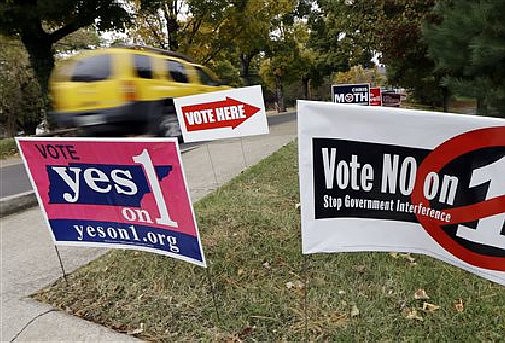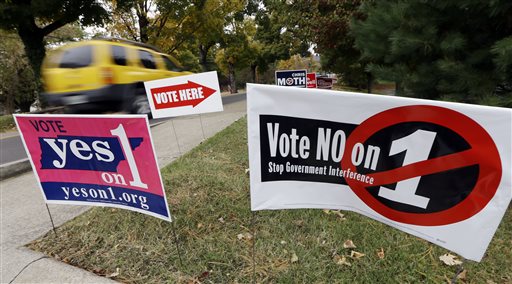MORE ELECTION COVERAGE• New era for abortion in Tennessee; voters open door for more regulation• Full voter guide results• GOP takes control of Senate, ending eight-year Democratic run• Republican incumbents easily take Tennessee's 3rd, 4th districts• Hamilton County cities vote to allow wine in grocery stores• Republicans Gov. Nathan Deal, David Perdue win in Georgia• Rogers defeats alleged sexual harasser Sharrock in Fort Oglethorpe contest• GOP sweeps governor's races; Wisconsin gives Walker 3rd win• Ballot measures: Oregon, D.C. voters OK use of pot
Tennesseans were saying with their votes late Tuesday they're willing to trust their legislators to suggest and pass common-sense regulations on abortions and to advise and consent on the governor's choices for state Supreme Court and appellate court judges.
They also were overwhelmingly saying they wanted the state constitution to forbid an income tax and wanted military organizations to have the same opportunity as other charities to hold legislature-approved, gambling-type fundraisers.
Whether the "yes" votes on the state constitutional amendments receive 50 percent (plus one vote) of the total in the governor's race was undetermined as of press time.
The trending "yes" vote on Amendment 1, making the state constitution neutral on abortion, would be galling to pro-abortion supporters, who were certain they would win.
However, many voters remembered how the state Supreme Court -- finding a broader right to abortion than in the United States Constitution -- struck down in 2000 what many felt were common-sense regulations. And they have been biding their time, waiting for an opportunity to have their say.
Among the regulations struck down 14 years ago, similar to ones still in force in many states surrounding Tennessee, are a mandatory 48-hour waiting period before receiving an abortion, mandatory physician-only counseling before an abortion and a requirement that second-trimester abortions be performed in hospitals as opposed to clinics.
What could be so wrong with regulations that seek only better health care for women in such trying situations, they wondered.
Ultimately, many voters rejected what they must have sensed as a desperate attempt by the "no" campaign when it began to suggest a win on Amendment 1 could end abortions in the state and would damage women's health.
A woman's right to abortion cannot be taken away by any laws legislators would pass. And any common-sense regulations could only help, not hurt, those who seek abortions.
And, if the "yes" vote is successful, it's no wonder the "no" campaign had to look elsewhere than to individuals in the state for funding.
Indeed, of the $4,018,436 the No on 1 campaign had collected as of Oct. 25, 94 percent came from Planned Parenthood affiliates, the American Civil Liberties Union and two Tennessee abortion clinics. Eighty-eight percent came from Planned Parenthood alone, including nearly $2 million from out-of-state Planned Parenthood affiliates. Of that $2 million, $800,000 came from a Washington-based affiliate, $411,200 from Massachusetts and Northern California affiliates and $275,000 from the Los Angeles area.
Here's hoping come January, when the Tennessee General Assembly convenes, if legislators have the opportunity, they move carefully in their consideration of just what regulations on abortions they suggest. In such a case, they should ensure such regulations are U.S. Supreme Court bullet-proof before proceeding. But proceed they should, if given the chance.
• Legislators also would get their say on governor-appointed judges. With a Republican governor and a large Republican majority in both houses, choices in the near future will probably be rubber-stamped. It'll get a bit dicier if the governor or one or more houses are of different parties. That should make for some interesting political theater.
• The state currently doesn't have or need a state income tax. Since nearly two-thirds of state voters said -- emergency need or not -- they want it forbidden, let's hope the day never comes when it is needed or desired.
Painting the state red
Gov. Bill Haslam, U.S. Sen. Lamar Alexander, U.S. Reps. Chuck Fleischmann and Scott DesJarlais, all Republicans and all incumbents, sailed to re-election in Tennessee, surprising few.
Fleischmann, after nearly losing in the August primary to challenger Weston Wamp, might have expected to do a little worse in the general election against a better funded Dr. Mary Headrick, also his challenger in 2012. But, as of late Tuesday, he was around the 61.5 percent of the vote he got two years ago.
DesJarlais, meanwhile, was doing even better than he did in 2012, when he was dogged by personal allegations. Now, having survived by 38 votes a Republican primary challenge from state Sen. Jim Tracy and a diagnosis of cancer, he had more than 58 percent of the vote against well-funded, well-spoken Democrat Lenda Sherrell.
In the only contested state legislature race in the Chattanooga area, well-connected Republican Patsy Hazlewood was elected to represent District 27 in the state House.

